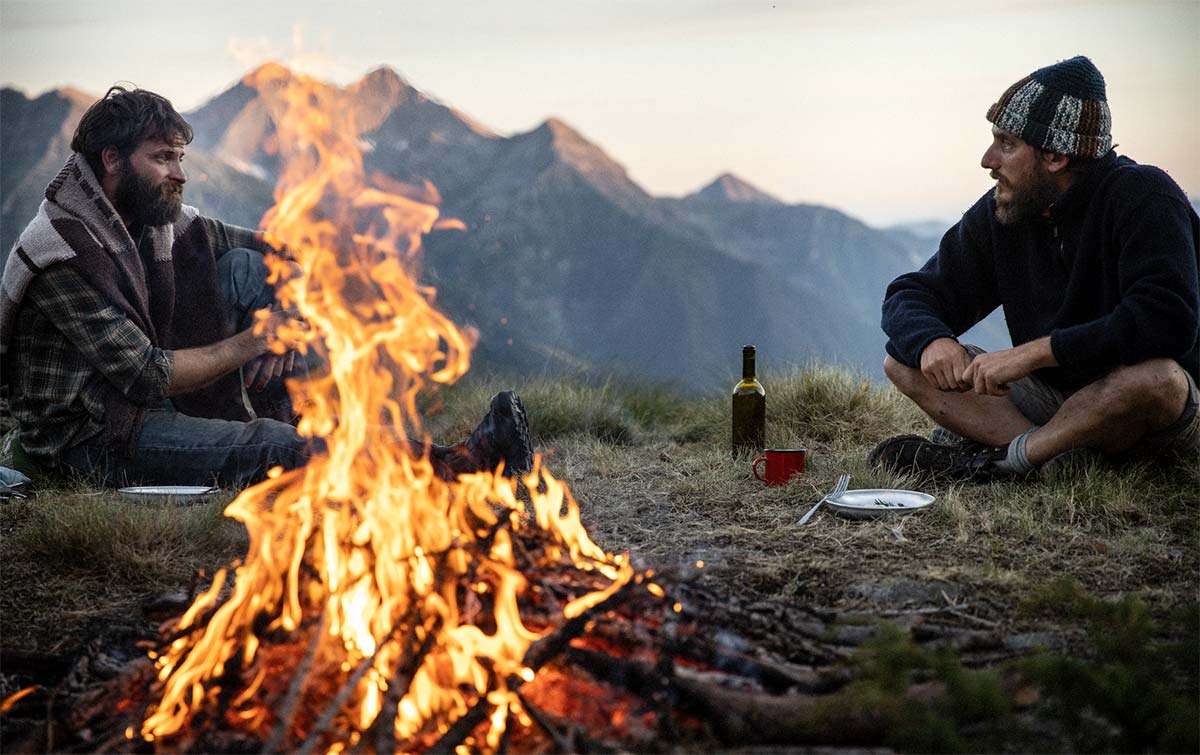There must have been something in the air at the 2022 Cannes Film Festival, where two of the top prizes went to Belgian films about the impossible standards set up by masculinity leading to tragedy. Lukas Dhont’s Close, which centers on the end of the friendship between two teenagers over a harrowing school year, won the Grand Prix. The Jury Prize went to Felix van Groeningen and Charlotte Vandermeersch’s The Eight Mountains, which concerns the end of a friendship between two men who meet as boys during a summer that marks them for the rest of their lives.
Whatever its pictorial beauty, often significant, this adaptation of Paolo Cognetti’s bestseller exemplifies my distaste for films that depict toxic masculinity without questioning it, or even suggesting there is nothing heroic or brave about refusing to leave behind damaging practices as long as they perpetuate some limited idea of what constitutes manhood.
We first meet Pietro (Luca Marinelli) as a disembodied being who, in voiceover, tells us about the summer of 1984, when he first met the friend who would change his life: Bruno. Pietro’s parents decide to escape Turin for the summer and rent a cabin in the remote Alps, where their only child (played by Lupo Barbiero) finds an unexpected adventure companion in Bruno (Cristiano Sassella), the sole child left in the village.
Besides creating the dramatic tension that will come in handy later in the manipulative story, Bruno’s fable-esque existence is explained in terms of how he’s another slab in a chain of men who have been doomed–or blessed, depending on who explains it–to remain attached to the place where they were born. Bruno belongs to a long line of cattle-herders who don’t know anything beyond the alpine surroundings they’ve seen every day of their lives.
And what surroundings! Stunningly captured by cinematographer Ruben Impens as both overwhelmingly imposing and curiously intimate, the vistas of Aosta Valley, where Eight Mountains was shot, offer the kind of visual spectacle where all you need to do is place the camera somewhere and let nature put on a show. Impens knows better than to rely upon ostentatious formal tricks, more often than not setting up the camera as if it were capturing a postcard view, corrupted only by humans who fail to be humbled by the magnificence around them while trying to extract meaning while the mountains quietly whisper immemorial truths.
That first summer, Pietro and Bruno spend their time diving in the bluest waters, frolicking in green pastures, and exploring cream-like glaciers, where they take conversational breaks to bond over being misunderstood by their fathers. Pietro’s dad has essentially abandoned him, having left the mountains to work in construction, while Bruno’s father (played by a remarkable Filipo Timmi) remains present but painfully distant. Deep inside, Pietro knows his father would have wanted a son like Bruno, and in being close to him expects to have some of his alpha toughness rub off.
Pietro’s parents are so touched by the friendship their son has struck with Bruno that they propose he moves to the city with them in order to pursue formal education, but his father––who never appears onscreen––wants something else for his son and takes him away to work with him. Pietro never speaks to his father again.
Almost two decades later the childhood friends meet again as bearded men who would rather grunt than express feelings. Pietro (Marinelli taking over) continues his search for meaning in the world, while Bruno (Alessandro Borghi) has reclaimed his mountainous throne where he continues milking cows by hand and leads a practically prehistoric life. Looking to capture magic moments shared as children, they decide to rebuild a cabin far up in the mountains where they make a pact to meet each summer.
But before their straight Brokeback Mountain dreams come true, Pietro makes a discovery that reeks of betrayal and puts everything into perspective, sending him on a soul-searching journey the likes of which Hermann Hesse wrote about, with subtlety and grace lacking here, in works like Narcissus and Goldmund and Siddartha. Pietro’s journey literally takes him to Nepal (again, no one dies in the Himalayas) where it almost seems the possibility of reaching the highest altitudes will finally provide him evidence of his divine mission––if he even has one.
Though Van Groeningen and Vandermeersch conjure beautiful images and visual poetry (a boy disappearing downhill is replaced by his adult self climbing back), their simplification of the country mouse / city mouse dynamic fails to add any depth to a story that’s not as clever as it thinks. (Not for nothing that Pietro literally means “rock” in Italian.) It turns The Eight Mountains into nothing more than an unnecessary ode to masculinity.
The Eight Mountains screened at Sundance 2023 and will be released by Sideshow and Janus Films this spring.

